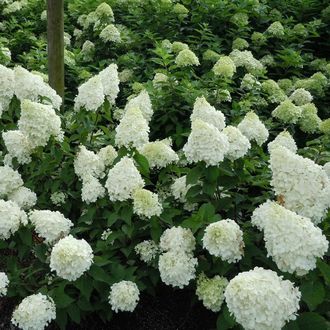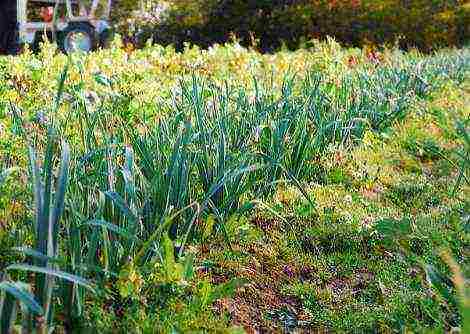Content [show]
Garlic is an essential hot spice in cooking. It has a pungent taste and rich aroma and health benefits. Growing garlic is a simple process, therefore, it is on every site. You can find a description of the most popular varieties and varieties in this review.
Varietal variety of garlic
However, not everyone knows that there are more than 70 varieties of garlic! This means that you can choose according to your taste, focusing on the conditions of a particular site with its soil, climate features, location. Moreover growing experience suggests that you should not limit your choice to one or two varieties. It is worth trying a few, and only after leaving the ones you like.
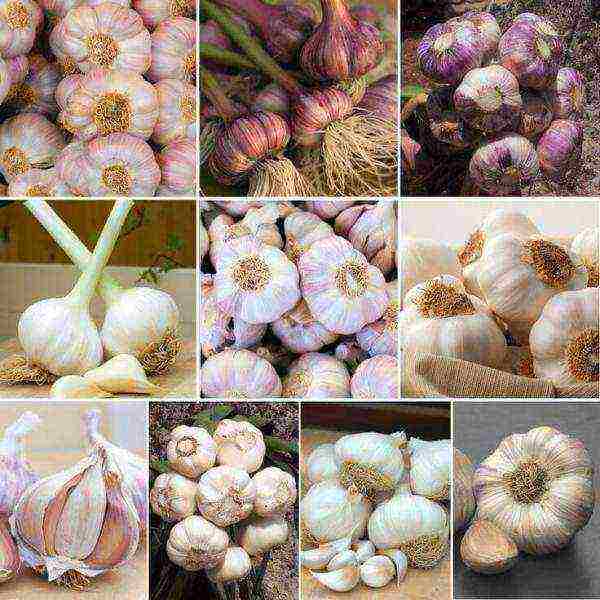 More than 70 varieties of spring and winter garlic are known
More than 70 varieties of spring and winter garlic are known
Such a variety makes sense, since some ripen earlier and they can be added to dishes already at the beginning - in the middle of summer, used for canning. Others ripen later, but are better stored.
Most popular varieties
Since the varietal variety is great, this article describes popular, popular varieties.
Spring
Spring garlic differs from winter garlic in different planting periods (spring garlic is planted in spring, and winter garlic - in late autumn), yield - spring garlic is less productive, unlike winter garlic.
To visually recognize spring garlic, you need to pay attention to the following signs:
- spring garlic without central bararound which the denticles are located;
- themselves spiral teeth - the closer to the center, the smaller they are;
- teeth can differ from each other by size and shape;
- spring garlicno arrows.
Popular varieties of spring garlic:
Victorio
 Spring Garlic Victorio
Spring Garlic Victorio
Mid-season, high-yielding species. No arrows, resistant to pests and fungal diseases... The bulbs are flat-round in shape, the color of the scales is yellow-white.
Yelenovsky
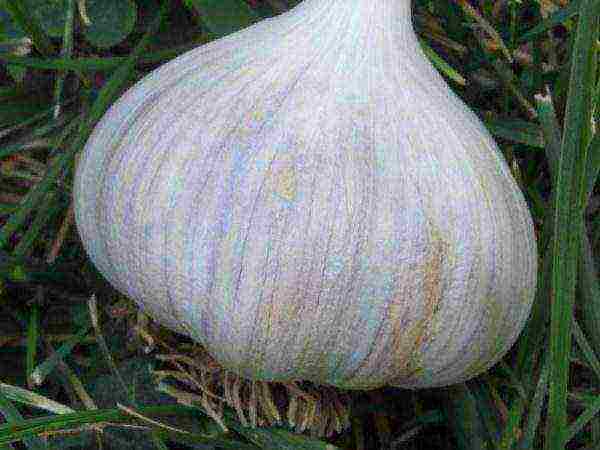 Spring garlic grade Yelenovsky
Spring garlic grade Yelenovsky
Mid-season, fruitful, round heads. Outside, the color of the scales is whitish, and inside, on the teeth themselves, it is pinkish... Demonstrates resistance to all plant diseases.
Gulliver
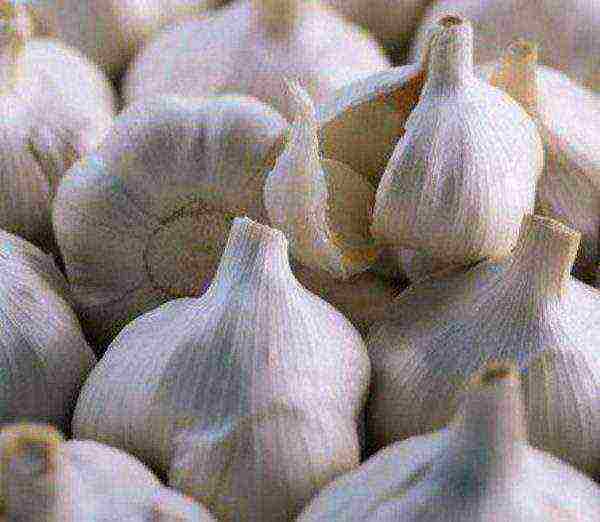 Spring garlic variety Gulliver
Spring garlic variety Gulliver
Considered mid-late. The harvest is good, it produces arrows. The bulb is round, slightly flat. The color of the scales is light, white. Little susceptible to diseases and pests.
Sochi 56
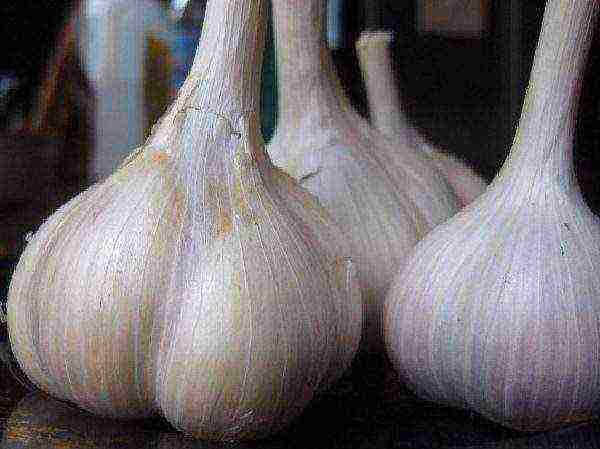 Spring garlic grade Sochi 56
Spring garlic grade Sochi 56
Mid-season, gives a stable and high-quality harvest. The shape of the head is slightly flat, rounded. The color of the scales can be white or purple, and on the teeth themselves - pink with a purple tint. Resistant to disease.
Ershovsky
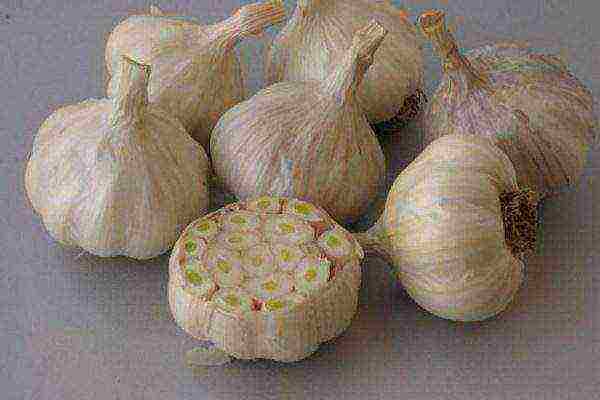 Spring garlic grade Ershovsky
Spring garlic grade Ershovsky
Belongs to mid-season, the bulbs are round, slightly flat. It does not produce arrows, the harvest is excellent. Resistant to disease.
Winter crops
For winter garlic, the following signs are characteristic, by which it can be visually recognized:
- rod in the center of the headaround which the denticles are located;
- the teeth are arranged in a circle, in one row;
- teeth the same;
- harvest gives higher;
- in winter crops -arrows grow on which tiny onions are then formed.
The best-selling varieties of winter garlic are:
Lyubasha
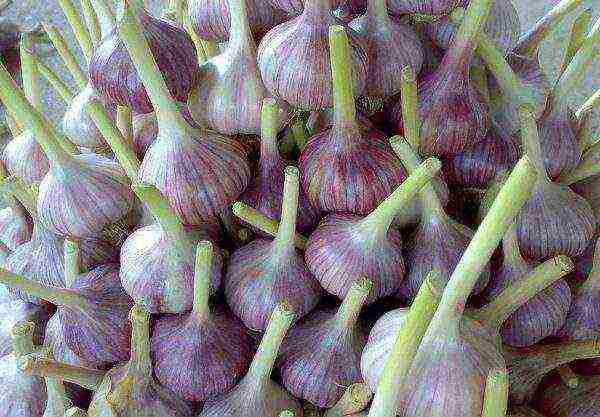 Winter garlic grade Lyubasha
Winter garlic grade Lyubasha
Withstands severe frosts and dry summers. It is considered quite high - the stem is up to 120 cm. The bulb is round, slightly flat. The color of the scales is light with streaks of violet tones, resistant to diseases. Keeps perfectly. It has a bright spicy taste and is suitable for canning.
Dobrynya
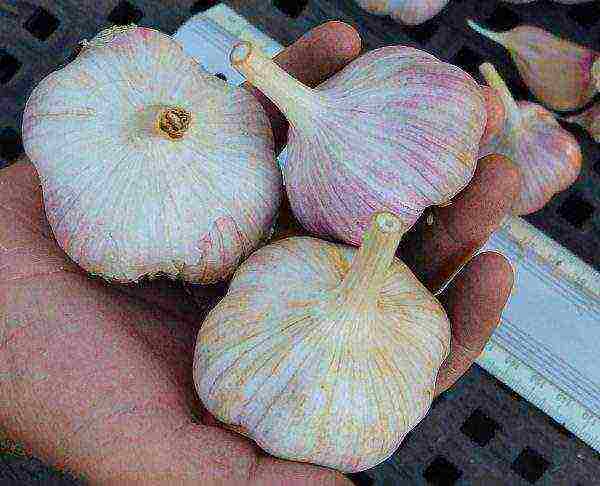 Winter garlic variety Dobrynya
Winter garlic variety Dobrynya
A productive variety, but less frost-resistant than Lyubasha. The heads are large, not too sharp, so it is good to eat it fresh. Ripening period - late. Dobrynya is well stored and is not susceptible to disease.
Sofievsky
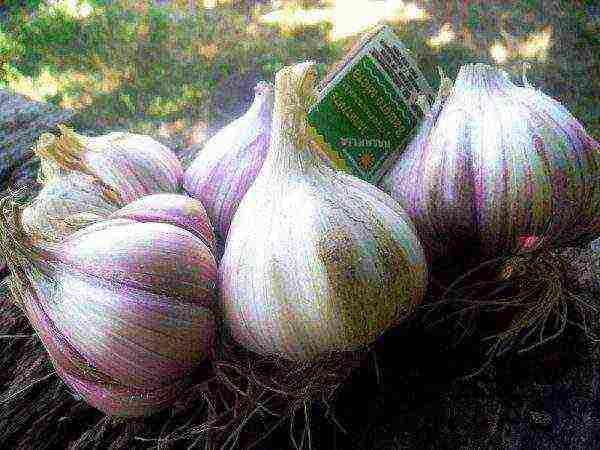 Winter garlic Sofievsky grade
Winter garlic Sofievsky grade
It perfectly tolerates severe frosts, but in summer it is picky about heat and light. Not too high - about 70 cm. Large onion - 100 g with large cloves. The color of the scales is pale purple. Nematode resistant, moderately pungent taste.
Alcor
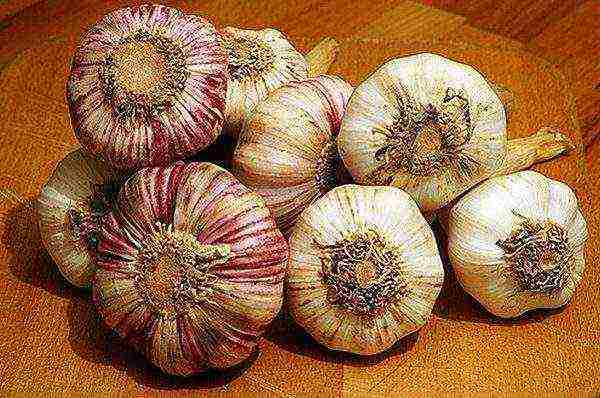 Winter garlic grade Alkor
Winter garlic grade Alkor
High-yielding, excellent storage. The color of the bulb is pinkish, and the cloves themselves are closer to gray. Damaged by yellow dwarfism.
Dubkovsky
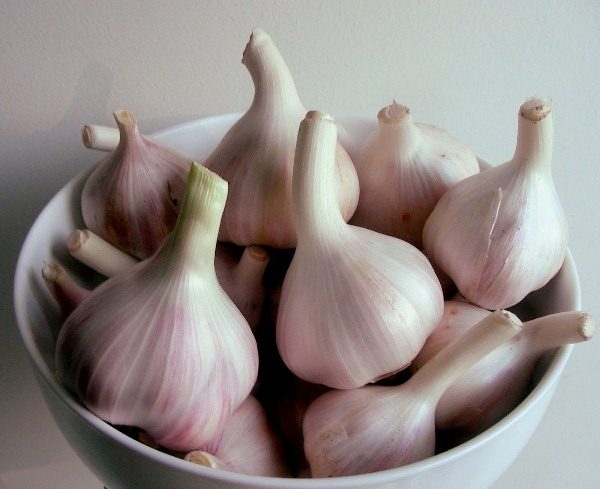 Winter garlic variety Dubkovsky
Winter garlic variety Dubkovsky
High yielding, good storage performance. The stem is of medium height, the bulb is not large, rarely weighs more than 50 grams. It is stored excellently, the taste is spicy.
In winter crops, it is imperative to cut off the arrows at the base, otherwise the head will be shallow. Do not break the arrows so as not to damage the bulb.
Shooters
Garlic that produces arrows is sharper in taste, more productive than varieties without arrows, it is better stored. Among the shooters, the most noticeable are:
Gribovsky jubilee
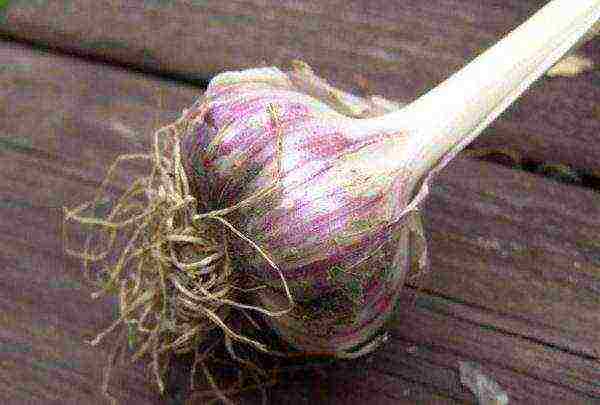 Shooting garlic variety Gribovsky jubilee
Shooting garlic variety Gribovsky jubilee
Medium-sized winter variety. The color of the scales is reddish-purple. Disease resistance - at a high level, stored well.
Gribovsky 60
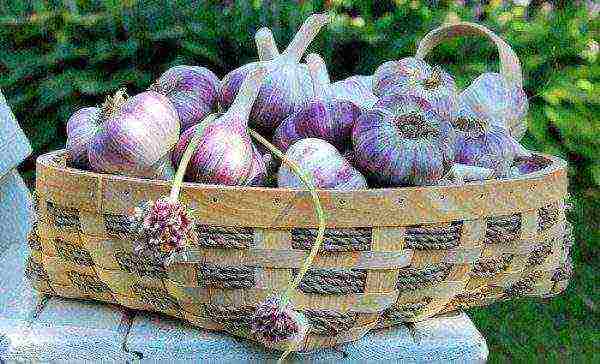 Shooting garlic grade Gribovsky 60
Shooting garlic grade Gribovsky 60
Harvest early maturing, resistant to freezing and drought. The bulb is medium in size and keeps well. Not damaged by bacteria and viruses.
Scythian
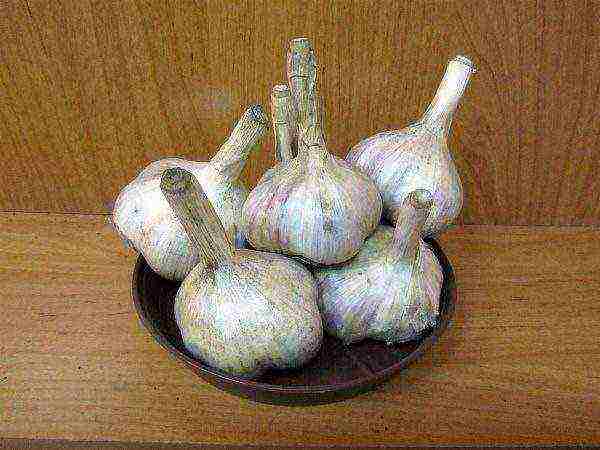 Shooting garlic grade Skif
Shooting garlic grade Skif
Frost-resistant variety, resistant to diseases of this plant. The color of the scales is gray with streaks of purple, and the teeth themselves are creamy.
Large-toothed Kiseleva
 Shooting garlic grade Skif
Shooting garlic grade Skif
Early ripening, the head is more than average, about 80 g, the taste is pleasant, spicy. It is not susceptible to disease, storage periods are long.
Hermann
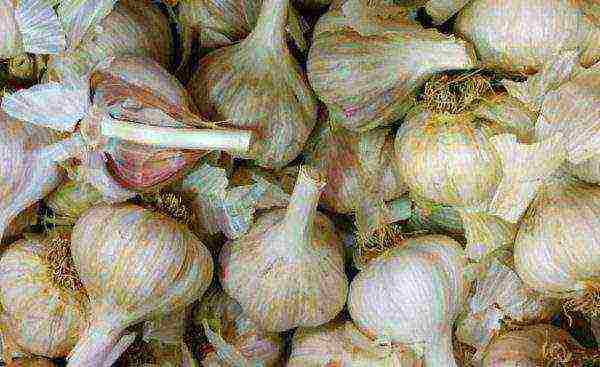 Garlic variety Herman
Garlic variety Herman
The bulb is round, conical, the color of the scales is whitish-lilac, and the cloves are cream. Stored up to 8 months, resistant to fungal and bacterial infections.
Non-arrow
Of the non-shooting, the following are popular:
Aleisky
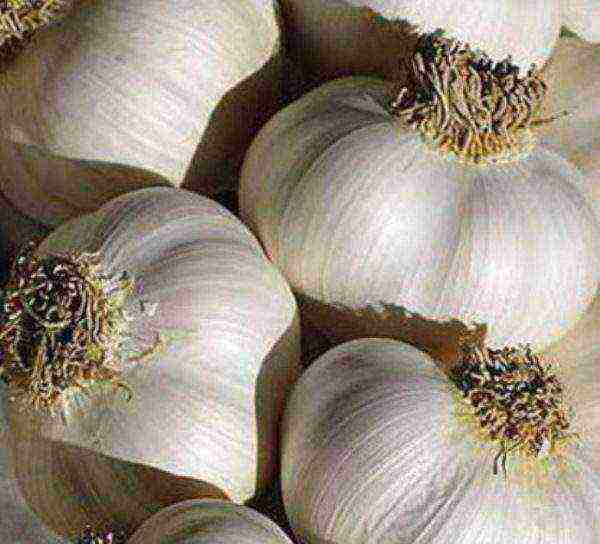 Aleisky garlic variety
Aleisky garlic variety
Mid-season, round bulb, flat, stored until spring.
Moskovsky
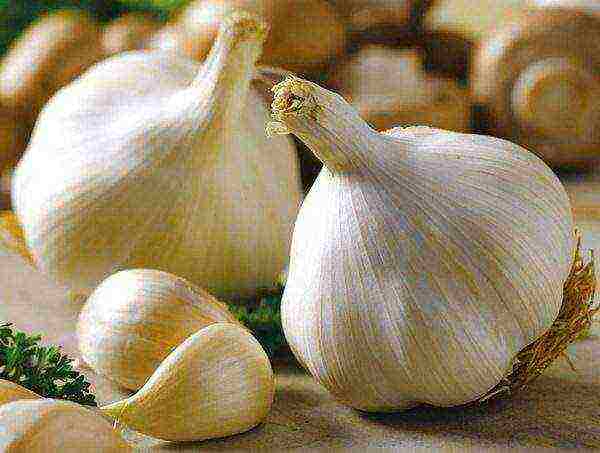 Garlic variety Moscow
Garlic variety Moscow
Mid-season, well kept, not too sharp the color of the scales is light, the teeth are white.
Abrek
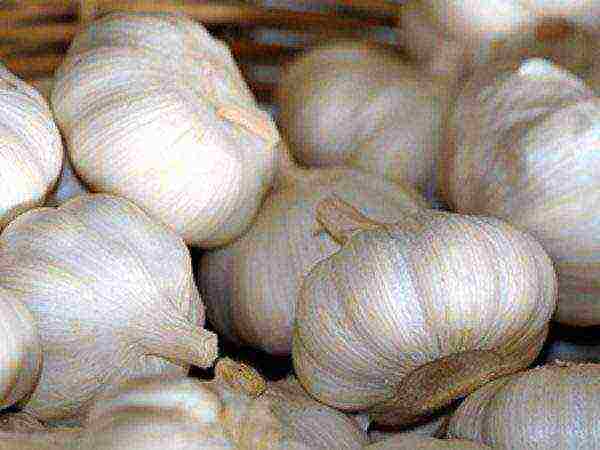 Garlic variety Abrek
Garlic variety Abrek
Similar to Moscow, but the head is slightly larger.
Odessa 13
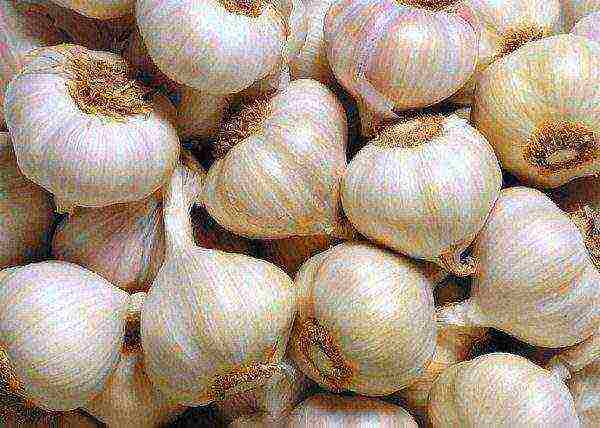 Garlic variety Odessa 13
Garlic variety Odessa 13
It happens spring and winter, the color of the scales is white, sometimes with stripes of purple tones, stored wonderfully.
Gafurian
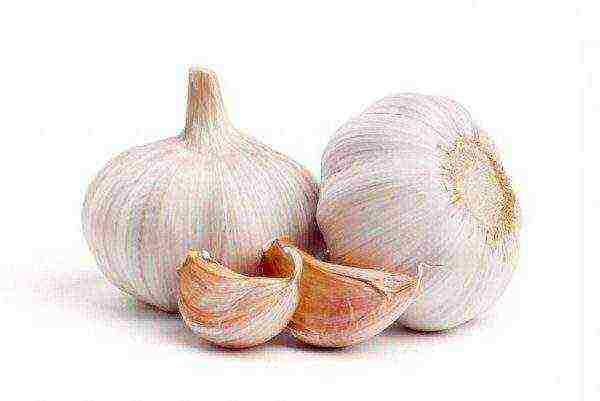 Garlic variety Gafurian
Garlic variety Gafurian
Medium-sized onion up to 40 grams, round, flat. Resistant to rot, but sometimes it is prone to powdery mildew.
The best large varieties
Of the varieties with a large head, the following are known:
Alekseevsky (giant)
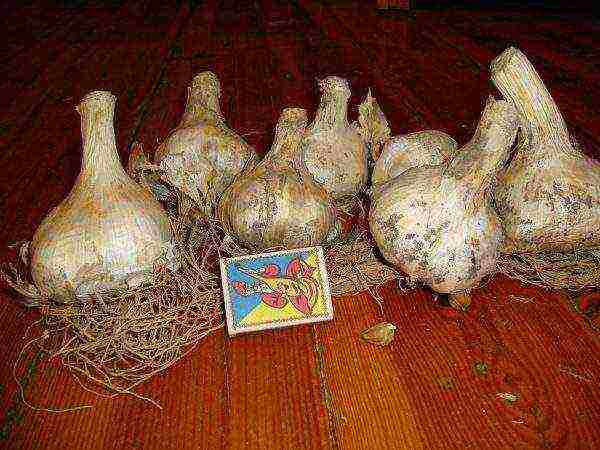 Garlic Alekseevsky (giant)
Garlic Alekseevsky (giant)
The bulb reaches 250 gr. Wherein resistant to disease and stored for a long time.
Komsomolets
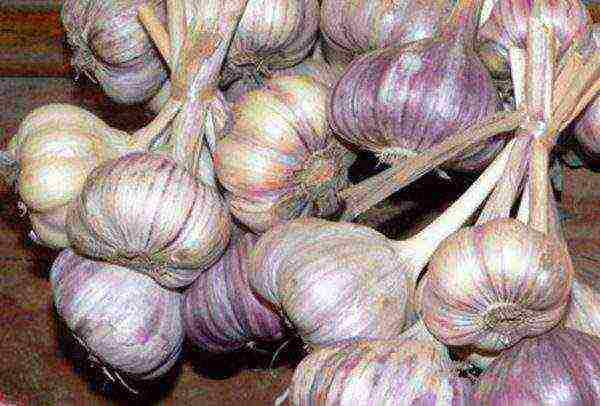 Garlic Komsomolets
Garlic Komsomolets
Shooting, winter, mid-season, flat-round onion, the taste is pungent.
Petrovsky
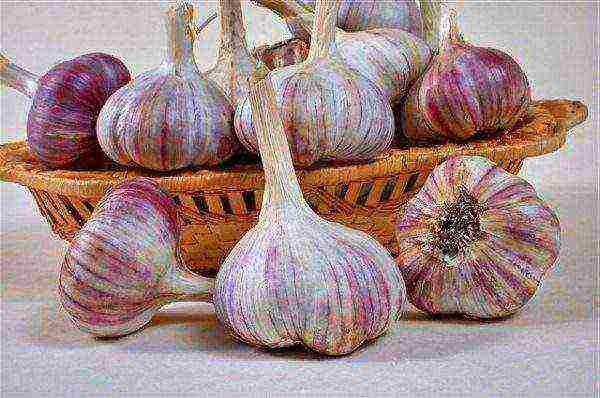 Petrovsky garlic
Petrovsky garlic
Looks like Komsomolets, resistant to disease.
Degtyarsky
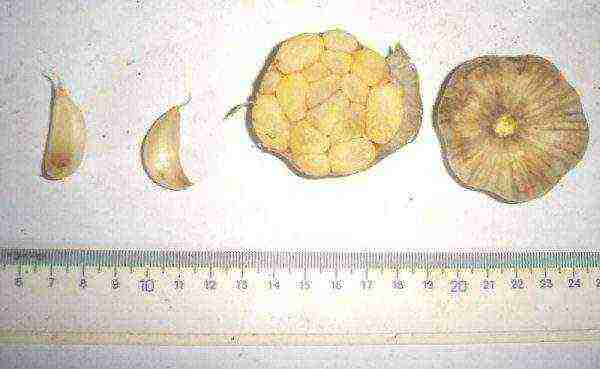 Degtyarsky garlic
Degtyarsky garlic
Spring, without arrows, the taste is moderately spicy.
Orlovsky
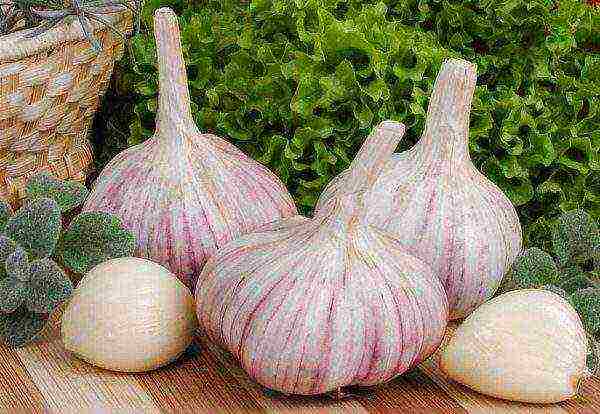 Garlic Orlovsky
Garlic Orlovsky
Spring, does not release arrows, onion over 100 gr.
Conclusion
These are not all varieties of garlic that are worthy of attention. AND do not be afraid to try new selection - there are many good varieties among them!
Foreword
Winter garlic is distinguished by unusually large heads and cloves. And if you also pick up a good variety, the harvest will surprise even experienced gardeners. In this article we will tell you about the best varieties of winter garlic for different regions of Russia, including the Moscow region, and describe in detail what kind of care this crop needs.
What is the best garlic to plant for the winter?
In varieties of winter garlic, experts distinguish two groups - shooting garlic and non-shooting garlic. True, this division is very conditional, because in the northern regions, arrowhead varieties often stop producing arrows with inflorescences, and in the southern part of the country - on the contrary. It is difficult for breeders to go against nature - most of the winter varieties are still with arrows.
Many gardeners use this quality - depending on the selected variety, one plant can produce up to hundreds of seeds, which many call "bulbs". Having sown them before winter, already in the next season you can collect a large number of one-toothed, and those, in turn, after a year, will give a good harvest of large garlic bulbs. Just a few arrows are enough to get enough planting material.

Of the shooters, gardeners often prefer varieties such as Krupnozubkovy Kiseleva, Gribovsky 80, Yubileiny, Dungansky local, as well as Otradnensky and Parus. Winter varieties of garlic without arrows are noticeably different from the previous version - although there are many cloves in the bulb, they grow medium-sized and at the same time of different sizes (see photo). Such teeth are arranged as if in a spiral and slightly "overlap" each other. Among those who do not shoot, such varieties of winter garlic as Lekar, Danilovsky local, Shirokolistny 220 and Novosibirsk are in demand.
Nowadays, in stores you can see not only domestic, but also crops imported from other countries. When buying, this should be taken into account, because many foreign farmers in a difficult climate add a large amount of fertilizing to the soil to get a good harvest. Garlic heads have the peculiarity of accumulating heavy metals that are very harmful to the human body, and therefore it is best to eat vegetables in which you are sure - that is, plant and grow the crop yourself.
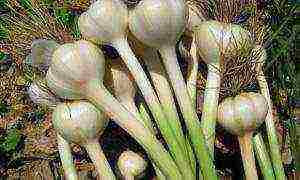
The stems of this plant can reach a height of about one meter, but the roots are usually located at the level of 30-40 centimeters. It is interesting that when the bulb itself has already reached full maturity, the roots die off, and then new ones appear for the winter. It is also important to know that a shooting plant can simultaneously develop both sterile flowers, which are without seeds, and the very "bulbs". Winter garlic can be propagated with “bulbs” and chives, and non-shooting varieties can be propagated only with chives.
It is better to plant winter garlic only in those regions where it will definitely not freeze, but spring garlic, which is called spring garlic, is best planted in areas where the summer is warm, so that the culture has time to ripen in time.

It is the varieties with arrows that are more adapted for planting as winter crops, and those that do not shoot are more suitable for spring crops. By itself, both spring and winter garlic are quite picky about the presence of moisture, but at the same time they do not like strong waterlogging. However, soil too dry by the sun will not suit him. The roots of the bulbs begin to grow even at 1-2 degrees of heat, and the leaves - at 3-4.
Winter garlic - what to choose?
If you decide to plant a spring variety, then its bulbs will probably last after harvest until next fall. But winter varieties are much more difficult to maintain.True, they are more productive - with good care and watering, the heads can be the size of a fist! Such garlic should be planted for consumption in the first place, as well as for use in conservation.
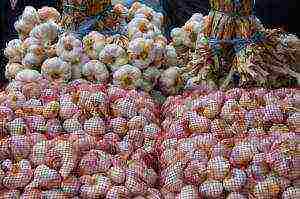
Today it is quite difficult to find breeding varieties. Basically, they buy in Russia the local Bryansk variety, famous for its large garlic bulbs, Breitovsky spring. In the Moscow region, preference is often given to the Podmoskovny garlic variety - it is mid-season and at the same time resistant to various diseases. In fact, this culture does not adapt well enough to changing growing conditions.

Therefore, it is not advisable to plant that winter garlic that was grown in distant lands, even if it is just a handsome man in the photo. Better to buy varieties that are familiar to the local climate. When purchasing planting material, pay attention to the winter hardiness of winter garlic and the early maturity of spring varieties. A reliable choice for the Moscow region is the variety of the same name, in which the bulbs reach a weight of 60 grams, garlic has 5-7 cloves. The variety can yield up to 1.9 kilograms per square meter.
Interesting facts - how and where did garlic come to us?
Garlic itself can still be found in the wild. Historians claim that for the first time this culture began to be grown in Central Asia. It was from there that garlic was brought to Egypt, and then to Ancient Greece and Rome. Since then, it began to be planted and grown in different countries and used in the preparation of various dishes, as evidenced by the old recipes that have survived to this day.
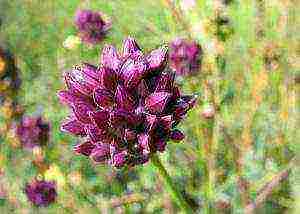
Even in Tibetan monasteries they knew what winter garlic is. Japanese, Indian and Chinese doctors recommended it as a medicine. Nowadays, it is more often used as a spice, although garlic is still used in folk medicine as an effective remedy for many diseases. It was not in vain that they said that winter garlic can cure all diseases, but old age say wait. Many treatises have been written about the magical power of garlic as a means of giving strength and courage, some peoples even perceived it as an effective amulet against witchcraft, evil spirits, vampires - any evil spirits.
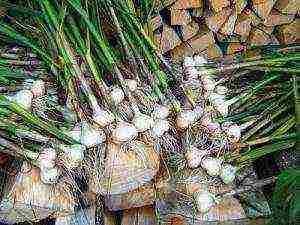
Earlier, winter garlic in the villages was also called snake grass and combed onions. Starting from the ninth century, this culture began to be planted in our area. At that time, the main territory for the successful cultivation of garlic was the lands of the Voronezh, Oryol, Tambov and Belgorod regions. We add that this plant, especially when it comes to young garlic, is very rich in vitamins and minerals. Ascorbic acid, sulfur, aluminum, copper, iodine, magnesium, essential oil - this is not a complete list of substances that can be found in cloves.
Rate the article:
(0 votes, average: 0 out of 5)
Winter garlic has a high yield and resistance to frost. But how not to get lost among the variety of varieties and choose the best one?
For a good harvest, it is important to be able to choose high-quality planting material suitable grade.
Winter garlic cloves should be:
- no dents;
- no rot;
- no cracks in the bottom;
- about the same size.
It is not worth peeling off the outer shell of the planting material, since in the future a head of garlic that has grown from a "stripped" clove will be poorly stored.
We invite you to get acquainted with the best, according to many summer residents, varieties of winter garlic.
Alcor
Mid-season shooted high-yielding variety of winter garlic. The bulbs are dense, rounded, pink-purple in color. Hardy, but affected by the yellow dwarf virus.
| Use | Taste | Number of teeth | Bulb weight (g) | Keeping quality | |
| spicy |
4-5 |
13-36 |
good | ||
Belorussian
An early ripening shooter medium-yielding variety of winter garlic.Bulbs are dense, large, off-white scales with a purple tint. Winter hardy, slightly affected by bacterial rot.
| Use | Taste | Number of teeth | Bulb weight (g) | Keeping quality | |
| spicy |
4-8 |
56-78 |
good | ||
Gribovsky jubilee
Mid-season shooted high-yielding variety of winter garlic. The bulbs are flat-rounded with a run up, purple scales, with dark purple veins. Winter-hardy, drought-resistant, disease-resistant.
| Use | Taste | Number of teeth | Bulb weight (g) | Keeping quality | |
| spicy |
5-10 |
24-44 |
satisfactory | ||
Lyubasha
Mid-season shooted high-yielding variety of winter garlic. The bulbs are flat-rounded, the scales are white or pinkish with faint blue-violet veins. Winter-hardy and drought-resistant, resistant to fusarium.
| Use | Taste | Number of teeth | Bulb weight (g) | Keeping quality | |
|
|
spicy |
5-7 |
80-120 |
good | |
Sail
Mid-season shooted high-yielding variety of winter garlic. The bulbs are large, flat-rounded with an upward slope, the scales are off-white with a purple tint. Winter hardy. Peronosporosis affects moderately, stem nematode and bacterial rot - weakly.
| Use | Taste | Number of teeth | Bulb weight (g) | Keeping quality | |
| spicy |
7-10 |
30-47 |
good | ||
Podmoskovny
Mid-season shooted high-yielding variety of winter garlic. The bulbs are flat-round, white scales with brownish-purple strokes. Winter-hardy, disease-resistant.
| Use | Taste | Number of teeth | Bulb weight (g) | Keeping quality | |
| spicy |
5-7 |
up to 60 |
good | ||
Sofievsky
Mid-season shooted high-yielding variety of winter garlic. The bulbs are large, flat-round, the scales are light purple in color. Frost-resistant, relatively resistant to nematodes.
| Use | Taste | Number of teeth | Bulb weight (g) | Keeping quality | |
| spicy |
6-8 |
80-120 |
excellent | ||
Saved
Mid-season shooted high-yielding variety of winter garlic. The bulbs are round-oval, the scales are gray with a red tint, as well as with deep purple veins. Frost-resistant, resistant to fusarium and nematode.
| Use | Taste | Number of teeth | Bulb weight (g) | Keeping quality | |
| spicy |
7-10 |
60-100 |
excellent | ||
Only the right choice of variety and quality planting material will help you get a rich harvest of winter garlic.

If you do not know what varieties of garlic to plant, then you should pay attention to zoned, large, high-yielding, as well as Dutch selection, which can be planted before winter. In addition, there are popular, winter-hardy, stored for a long time and do not deteriorate. What to choose for you, decide for yourself, but first, read more about the characteristics and description ...
What are the varieties of garlic
Garlic is not subject to a clear classification, so it is divided in different ways.
By arrows: Shooting and non-shooting garlic - some of the shooting varieties form air bulbs at the tips, thanks to which reproduction is possible. The bulbs collected in time are a healthy seed fund and help to significantly save teeth for planting, and the arrows are used for food. These are varieties of garlic Gulliver, Sofievsky, Dobrynya. Non-firing garlic - variety Aleisky, Lekar, Yelenovsky - also differ in the structure of the bulb, the prongs are layered on top of each other in a spiral in 2-3 layers. Such varieties save you from the hassle of cutting the tops, but you have to sacrifice such coveted cloves for planting.
By the content of essential oils: table varieties of garlic (spicy, usually pointed) and technical (medium spicy).
By landing time: winter and spring varieties of garlic. For cultivation on a personal plot, non-shooting high-yielding varieties of garlic are used - they are easier to grow, no costs for removing feathers are required. If garlic is planted before winter, they use both shooting species and not, but for spring crops, it is better to take non-shooting species.This is due to the fact that winter garlic is more productive, but less mature, spring garlic is the opposite.
Types of winter garlic
Winter garlic is planted in the fall and manages to take root before the cold weather, in the spring the plant immediately enters the growing season and yields a harvest from mid-summer. The best varieties of garlic for planting before winter are Lyubasha, Spas, Nadezhny, Violet Kharkiv, Ukrainian White. Certain speaking names of garlic varieties suggest for which regions they are bred, some we will talk about in more detail.
Recognized as one of the best varieties of winter garlic Alekseevsky giant - the record holder in yield, perfectly preserved until the next harvest, the bulb reaches 180 grams, has 4-5 teeth in one row, and the variety is also resistant to diseases. Possesses a pleasant aroma, spicy-sweet taste, white husk.

garlic variety Alekseevsky - in the photo
An excellent variety of large winter garlic -
Lyubasha , a large onion weighs 100-120 grams, sometimes more, the husk is white with a pink tint, the feathers are high and wide. The teeth are arranged in one row up to 9 pieces of white-cream color, high-yielding variety.

garlic variety Lyubasha - in the photo
Cassablanca - a new variety of garlic, white, up to 200 g, the head contains 8-12 cream-colored teeth with a pink tint. The species is disease-resistant, with excellent keeping quality. They are planted in the ground from September to November, and the harvest is harvested in July.
Gulliver - a variety bred in Russia not so long ago, this garlic is resistant to diseases, has excellent keeping quality. Matures in 90-100 days, high-yielding, pungent variety. There are 3-5 teeth in the head reaching a mass of 250 gr. The foliage is used for food. One of the varieties of the giant's garlic.
Non-shooting Podmoskovny garlic has a sharp taste, a head up to 60 grams contains 5-7 large cloves. Mid-season species with good yield indicators. The variety is intended for outdoor cultivation in the Moscow region.
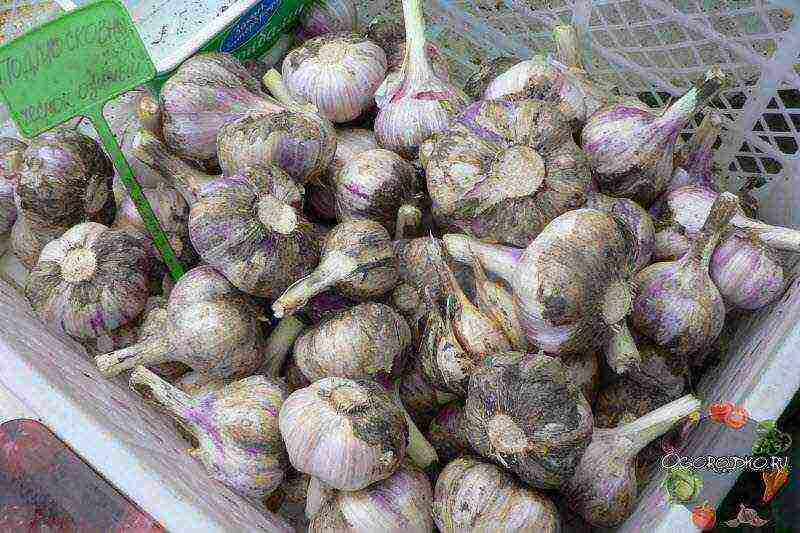
garlic variety Podmoskovny - in the photo
A variety of garlic was developed for the Urals and Siberia
Nazus enduring frosty winters. An onion weighing up to 60 grams contains about 6 slices. The taste is semi-sharp, the species is suitable for growing in garden plots.
Alcor - stable, mid-season garlic variety, with a vegetation period of about 90 days; Losevsky garlic - spicy, large onions; Dobrynya - good for preservation and pickles; sharp Gribovsky - for growing feathers and disease resistant; frost-resistant, large, sharp - Komsomolets garlic.
Spring Garlic Varieties
Spring garlic is especially picky about climate change, therefore, it is better to choose the types common in a given climatic zone. Usually, you can navigate by the name of the variety - Moscow, Cheboksary, Ukrainian, Kharkov, Leningradsky. For example, Sochi 56 is grown not only in Sochi, but also in the Kuban, throughout the Krasnodar Territory, as well as in the North Caucasus.
But, it is not always possible to determine the landing area by name. The Aleisky variety is good for western Siberia; harvesting of spring garlic will begin in just 125 days. Gafurian garlic is good for planting in the Sverdlovsk region and the Volgo-Vyatka region. The popular varieties of spring garlic are Aleisky, Sochi 56, Yelenovsky, Abrek, Victorio, Flower.
Titanium is a type of garlic with the largest cloves up to 25 grams. One head can weigh up to 200 grams and have from 4 to 6 teeth, has a slightly pungent taste. Garlic Permyak is perfect for growing in summer cottages, has a particularly pungent taste. The head is small with 15-17 teeth. The storage of garlic is about 10 months.
Garlic Kledor is bred in France and belongs to the elite varieties, well adapted in Central Russia, Belarus and Ukraine, the variety is grown in the Leningrad region. Produces a bountiful harvest. A light bulb contains up to 20 large teeth in pink scales. Has a mild pungent taste, perfect for preservation and eating.Stored until the next harvest.
Dutch garlic and other popular varieties
Distinctive features of the Dutch varieties of garlic can be called a rich harvest, excellent keeping quality, frost resistance and resistance to various diseases. They have a wonderful presentation, are unpretentious in care, early maturing.
The Germidor variety produces small heads up to 60 mm in diameter. The teeth are covered with purple scales, in one bulb you can count from 8 to 15 pieces. The stem is relatively low - up to 75 cm. Garlic Messidor is the owner of a large snow-white bulb with 8-12 teeth.
Elephant garlic is a type of leek with a distinct garlic flavor. It got its name from a giant bulb divided into 4-6 teeth. Contrary to public opinion, Elephant Garlic and Rocambol are different vegetables. Rocambol is a shooting garlic.
The garlic Yellow giant, Tien Shansky, Tonus, early Thermidrom, very large Krakow, super-early with delicious foliage Chinese, high-yielding Sofievsky is deservedly popular.
Garlic has also found application in pharmaceuticals; various drugs are made from it that help in the treatment of ailments. In turn, science is helping to find new species with the best performance. Perhaps very soon there will be varieties of garlic that can survive any weather conditions, show consistently high yields and resist diseases.
